Sport - Interview

Interview with Timothy O'Donnell, World Champion Professional Triathlete
Sport - Interview
by Meryem Aksoy
Usually, triathletes do not start their career by stepping directly into the Triathlon; they all have a career in one of the triathlon trilogies as swimming, running, or cycling. And when the time comes, they find themselves in one of the world's most challenging sports. Timothy O'Donnell has begun his career as a swimmer and achieved many successes in swimming pools until he decided to become a triathlete during his college years. In 2008, he decided to pursue a professional career, and in 2009 he started to achieve great successes at ITU and IRONMAN organizations. Timothy O'Donnell has more than 50 podiums and 22 wins in contests all over the world. In addition to the 2009 ITU Long Distance World Champion victory, he earned nine Ironman 70.3 victories, two IRONMAN, and six Armed Forces National Championships. In 2015, he took third place in the IRONMAN World Championship in Kona, Hawaii. In 2013, 2016 and 2012, he was in fifth, sixth and eighth places. In 2013, he broke the American IRONMAN record in IRONMAN Brazil with 8:01:32. Again at the same competition in 2015, he performed his best time so far with 7:55:56. In addition to his international achievements in the IRONMAN organization, he was the IRONMAN 70.3 US Pro Champion in 2012 and the IRONMAN US Pro Champion in 2011. Timothy O'Donnell is one of the world's most experienced and successful long-course triathletes. With the ability to carry out his sports career and family life in full balance, he is an inspiration to new triathletes who would like to pursue a professional career. I had the chance to learn Timothy O'Donnell's opinion about the importance of individual sponsorships in Triathlon. I want to thank Timothy O'Donnell for taking the time to me in his recovery period of an unfortunate accident. I talked with Timothy O'Donnell, World Champion Professional Triathlete, about his career and the importance of individual sponsorship in Triathlon. Enjoy the interview!
Timothy, before talking about Triathlon and the importance of sponsorship, I would like to learn more about your life besides your professional career, could you tell us about yourself? Who is Timothy O'Donnell?
I am one of four, the youngest of four who grew up swimming. We lived all over the country. My dad was in the automotive industry a lot of corporate transfers, so we had the pleasure of moving around. My older sister had the displeasure of having to go to three high schools, but luckily, I only had to go to two. It was a great experience to live in different parts of the country and have to meet new friends and learn new places. So I saw it as a great benefit. As I said, I grew up swimming, swam at Wyoming Seminary Preparatory School in Kingston, Pennsylvania, and then went on to the swim at the United States Naval Academy where my older brother Thomas was also attending. At the Naval Academy, I was on the varsity swim team and the club triathlon team for my first two years before deciding to focus solely on Triathlon. That's kind of where my Triathlon career kicked off.
When I graduated from the Academy, I went to the University of California Berkeley for a Masters Degree in Ocean Engineering. I was an Ensign in the Navy, and after Berkeley, I proceeded to go into the Special Warfare or Explosive Ordnance Disposal (EOD) Community. I continued to race while in the Service, and at the end of 2008, I transitioned out of the Navy to pursue Triathlon as a career. In 2009 I met my wife Mirinda Carfrae here in Boulder, we've been racing together around the globe ever since and had our daughter Isabelle Grace in 2017. She's now almost two years old, and now it's the three of us on the road together!
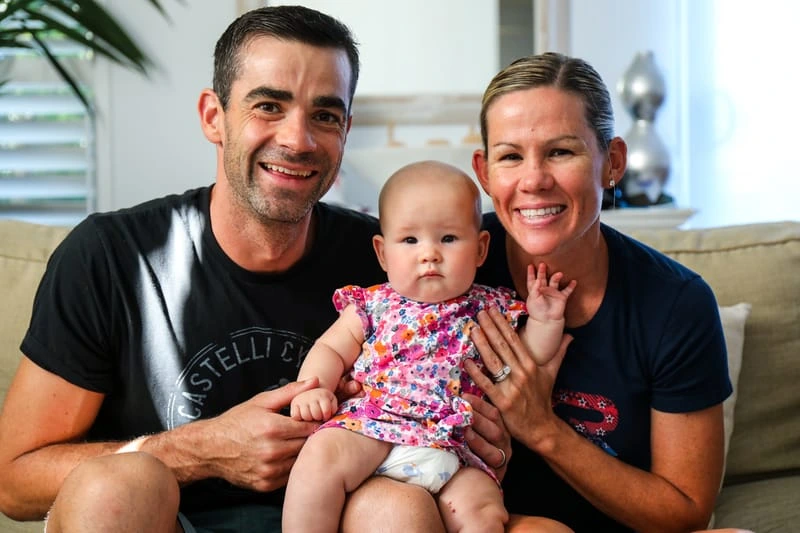
You have been swimming at a competitive level since you were five years old. In your high school and academy years, you have achieved many successes in the pool. What inspired you to dedicate yourself fully to Triathlon?
So when I was at the Academy, I was on the swim team, and I was also on the triathlon team for my freshman and sophomore years. I felt like I had plateaued a bit with swimming. I'd been doing it a long time, and I felt like there wasn't, much more I could gain from the sport.
But, at the end of my sophomore year, I went to Collegiate Nationals for Triathlon. I was very unprepared, but I ended up having a pretty good race. I was the number one finisher on the Academy team, and then I thought to myself: well, maybe there's something here for me, maybe I can do this. So at the end of my sophomore year, I decided to stop swimming and just focus fully on Triathlon. It was a new unique way to challenge myself physically, mentally, emotionally, and spiritually. While I was not very good when I first started Triathlon (I did not enjoy running), but I was really intrigued by the whole process and how much was involved in becoming a good triathlete. The sport piqued my curiosity; I wanted to see how far I could push myself.
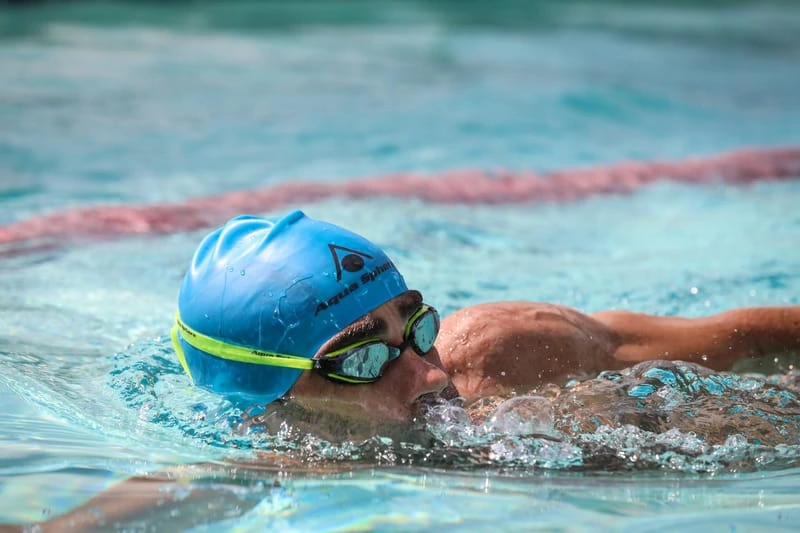
When did you decide to be a professional triathlete? Could you tell us about your triathlon career?
When I was at the Academy racing, I had a pretty quick rise to success on the Collegiate level. I was able to lead the Naval Academy men's team to two Collegiate National titles in my Junior and Senior years. I fully immersed myself, hired a coach, and got serious. My coach was involved with USA Triathlon and their development team, and he got me involved in the Olympic Pipeline. I went to the Olympic Training Center for some Collegiate camps and then some under-23 national team camps, that was the start of my professional career.
I think it was 2004 when I got my professional license. I actually didn't want to, but the national team coaches wanted me to do some professional Olympic distance ITU races. So I went ahead and got my license. I was racing strictly short course… and I was not very good at all! But I really enjoyed it. I was getting better, working on my run, made the US national team and went to some World Championships. Still, I knew my calling was in long course racing.

At the end of 2008, I got out of the Navy. I was sixth an Olympic trials for the four-person roster, just missed the big team in 2008 and I decided to take on Triathlon as a full-time career. I moved to Boulder Colorado at the start of 2009 and started doing Half Ironman distance races. This was my sink or swim moment. I had enough money saved to support myself for a year or so to try to get some results. At that time, I had no sponsors and no income from the sport. I had to make my way off of prize money now.
But 2009 was a huge year for me. I won my first Half Ironman race in St. Croix and set a new course record. I went on to win quite a few other races in 2009 including the ITU Long Distance World Championships. By the end of 2009, with the wins and the world title, I was able to start getting some support from sponsors. I knew if I kept at it, I could make Triathlon a career.

What was the most unforgettable moment in your career?
The first win at St. Croix was really special. At the time, I didn't know if I could cut it in Triathlon. I didn't have a lot of confidence in myself as an athlete, especially as a runner. Even though my running had progressed fantastically, I hadn't seen it come to fruition in a race. But in St Croix, I just went all in. Not only did I win, but I ended up having the fastest run split of the day. That was an important moment for me; it jumpstarted my career.

You are married to Mirinda Carfrae (IRONMAN World Champion 2010, 2013, and 2014). You are a couple who have achieved the top level of success in the same sport. What is the secret to having a happy family life while you are doing a sport that has such a hard training and competition schedule?
It's hard balancing Triathlon, particularly long course training, with a family. I think it helps that we both do it because we understand that dedication and the time that it requires to be successful, especially at this level. That's a big part of it, and we also have to make sure that we take time for ourselves, particularly in the offseason. After Kona we step away from the sport, it is important to keep a perspective beyond the sport. Both of us have seen Triathlon as a long-term career, it's very easy to burn yourself out. Many athletes go all in at the beginning, overdo training, get injured or overworked, and their careers fizzle. We wanted long prosperous careers, and that meant having a life balance. We have no problem with cracking a bottle of wine here and there. In offseason, we just don't train, we take some time off, and we enjoy each other. Now that we're parents, we try to take time to have a date night. If not every week, every other week, just to focus on each other. When you have a beautiful little girl, obviously you want to put all your energy into her, but I think it's important to make sure that you nurture your relationship with your spouse as well.
What does Triathlon mean for you?
Triathlon for me is really just a test of yourself physically, mentally, emotionally, and spiritually. It all gets tested on race day, especially in an Ironman when you're out there for eight hours (some athletes can be out there for 17 hours). That's a long day to battle with yourself, your mind, your feelings, your energy, all that stuff. It's almost mastering yourself as a whole, and I think that's one of the biggest draws of Ironman racing, you have to know yourself and you have to be honest with yourself to have success.

Triathlon is not like any other individual sport, you are competing in three different branches. Therefore, you need three times more equipment than an athlete. Compared to other sports, should triathletes have to find more sponsors to continue their careers?
It's great having a lot of sponsors because it's almost like having a diversified stock portfolio. If you lose one sponsor, you don't lose everything. That gives you a little bit of a safeguard in terms of trying to preserve some of those income streams. Because we're a smaller market, the partnership deals aren't massive, we're not a football player or a basketball player getting multi-million dollar contracts. In order to make a good living, you have to piece it together with multiple partners. I'm lucky that I do have endemic companies like my bike partner Trek or my running partner Hoka One One, they are invested in the sport and professional triathletes.
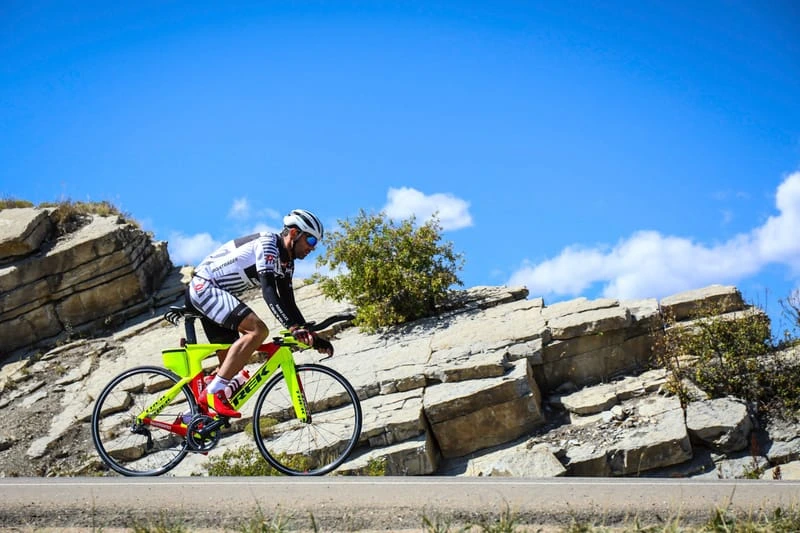
What are the main expenses of a triathlete throughout the year? How could triathletes finance these expenses? What is the permanent solution?
I think the biggest expense is definitely traveling; travel is very expensive. The Ironman World Championships are in Hawaii... there's no driving to that race! Between flights, rental cars, bike fees (it costs $200 each way to fly your bike) and lodging it can definitely add up. There is plenty of equipment to invest in as well and coaching. If you want a good coach that could be several hundred dollars a month. There are cheaper online programs, but a lot of people prefer to have the one-on-one interaction with their coach. In my opinion, having a good coach is one of the most important tools needed to succeed in the sport.
Some of the top professional athletes are lucky to have support from the races that will help them pay for travel expenses. But for most people, it's out of pocket. It's definitely a sport where you're on the hook for just about everything! In that sense, it's definitely tough. A great solution would be if you had airlines or massive hotel chains that became vested in the sport, which really isn't a stretch. If you look at the demographics of the seer group side of the sport, it's well-educated and high earning individuals with disposable income. They too spend a lot of money traveling to races: flights, hotel rooms, etc. Our audience is spending money, it should be an easy connection for airlines or hotels to understand the value of reaching them.

What is the best way to attract sponsors' attention?
First, you need good results, but this day and age, it seems like Instagram and social media are almost as important. I joke that I started this career wanting to be a professional triathlete, little did I know I'd just end up being a social media influencer :) But yes, you have to be visible. You have to be out there connecting with your audience. It is important to have some of the PR agencies of our partners pushing our story out to a wider audience. That's definitely a great way to get the attention of other companies, particularly non-endemic sponsors, which we would love to see enter triathlon.
In your career, when did you first attract sponsors' attention? How did you do this?
I was lucky that in my early years. I was still in the Navy when I was racing. I was in the world-class athlete program. So I didn't need to worry about sponsors. But I started with self-promotion, I would make pitch decks and presentations and send them out to all sorts of potential sponsors. I remember I made a DVD, with race highlights, I made pamphlets that back in the day I'd actually mail out to companies to try to get their attention. It wasn't until 2009 when I started to win races and started working with an agent that I began forming g partnerships. My agent, Samir, worked with one of the domestic cycling teams had a lot of connections in the industry. This was key, when comes down to it, it's a small industry. Having connections is really important, knowing who to call is probably the number one way to start new relationships in the sport.

What are the expectations of sponsors from triathletes?
Positively promoting the brand is the numb one expectation, and showcasing the product is very important and well. With the shift to social media and storytelling, having an authentic story and including sponsors in your journey seems to be the way forward in athlete marketing.
How did your life change after your first sponsorship agreement?
There is some personal validation in having sponsors, the feeling that you have made it. Your partners believe in you, they believe you can achieve your goals, and they are willing to support you. To back you up to bet on you with their dollars, I think there's definitely a validation there.
Could you tell us about your sponsors? What are the brands that you collaborate with?
My main sponsor over the last several years has been Trek Bicycles. They make more than just high-end performance bikes, they do everything, from kids bikes to commuter bikes to electric bikes. I love that their high-end bikes are still made in the United States (Waterloo, Wisconsin), which is pretty awesome. To have the support of an American brand still making bikes in the US, that's an honor for a patriot like me!

Hoka One One is my running partner, and they have been a massive supporter of Triathlon, including the Ironman brand. Usually, most companies use Triathlon as a stepping stone to get into running or other sports that have larger audiences, but Hoka has been very dedicated to our sport and triathletes as their main audience. It has paid off as well, Hoka sales are through the roof over the past few years and still growing very quickly!

Garmin is a great another American company that I'm proud to support. They've been very long long time running partner and the leader in GPS and other performance metrics.

Let's see who else, Castelli Cycling is my partner. They make very high-end race clothing and cycling training gear.

Halo Sport, which is a neuro priming headset that actually stimulates brain function and helps your muscle memory during those activities, definitely a great performance advantage.

And, Aqua Sphere is my wetsuit and swimming partner.

How do you make your sponsors' brands visible throughout the season? How many different platforms do you represent your sponsors?
Social media and racing are my main facets of exposure. The Ironman Show on NBC is one of our larger audiences, and Ironman Facebook watch channel has been a great development over the last year. I know some of the races are getting five-six million views live, that's a great audience. And, of course, social media, Instagram has been huge and a great way to show how we use our products and day-to-day lives. We have a YouTube channel as well the Tim and Rinny Show. That's been a fun way to tell our story organically. We are able to naturally showcase partners with product placement in the videos, you're going to see all the stuff we used today. You're going to see our bikes, our shoes and all that good stuff.

What are your expectations from your sponsors?
Really, I mean performance is always an expectation. You need to be a contender in Kona. The IRONMAN World Championships (Kona) is where it's at. Companies bet on you as an athlete because of what you can do or potentially can do in Kona. Next, you need to be a good Ambassador, someone that people like and represent the brand well. They want athletes with a good clean image that are relatable to the audience as well. And a lot of times you see guys with great results, great athletes, but they just don't connect with their audience. At the end of the day, that's what's important. We're here to help our Partners sell products.
What are you paying attention to when a new brand contacted you about sponsorship?
Number one, I want to make sure that the product is something I believe in. If there's no authenticity with you and the product and the brand, then I don't think it's a good fit people. Our audience is very smart, they're very aware. They're not going to buy something that doesn't make sense or, and they can eat you can always tell when someone doesn't really believe in what they're talking about. So that's the number one and then number two, making sure that you always want to be with a company that's got a good growth trajectory. You want to someone you can grow with, and even startups or maybe you can be part of the actual company, and some form of equity really invests you in the company and its success, and I think that's a win-win for both sides. Use a company with a good reputation, so you don't want to work with a company that supported dubious people are activities in the past because as an athlete you have a brand as well and you have to make sure the companies that you associate with aligning with your brand as well.

What are the main factors that affect the beginning and continuity of successful sponsorship collaboration?
I think open communication is massive between partners and athletes. We must have managers that handle the day-to-day with our partners, but you have to make sure that you're still connecting and you're on the same page. I think having a good strategy falls on the company. Your partner must have a strategy on how they want to use you, and clearly define how they want to use you. As an athlete, you're a goal-oriented type of person, and you want objectives that you can achieve, you want them to be clear. There's nothing worse than a partner paying you a chunk of money and then not knowing how to use you. They then end up being upset because the partnership didn't seem to pay off for them. So you have to be conscious that you're keeping in line with the goals of both sides.
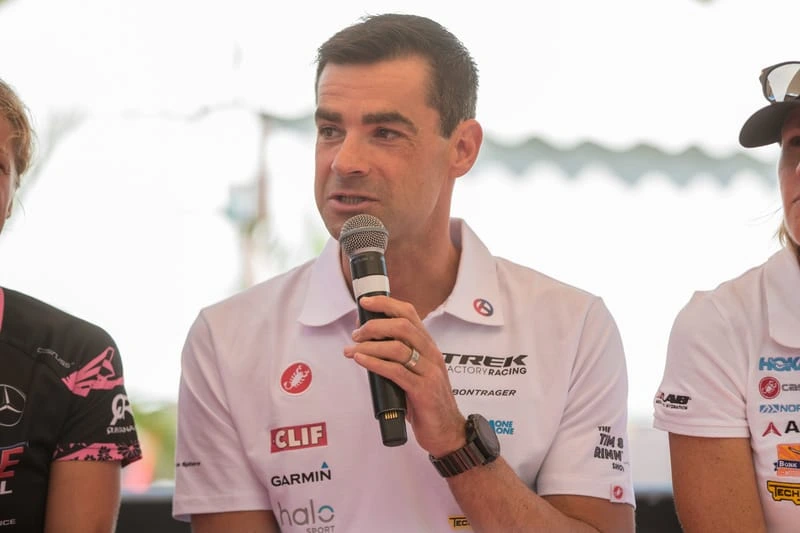
If you had a chance to speak on behalf of all professional triathletes at a meeting with brands, what would you say them for convincing these brands to sponsor triathletes?
I would say the main point is we have a great audience, it's a loyal audience. They are very well educated, there is a high percent in leadership positions with influence in their companies. They believe in health and wellness, and they're willing to spend money on a lifestyle that improves their quality life. It's not the biggest market in the world, but it's very targeted for the right companies. High-end brands could see some great gains by partnering with athletes in the sport.
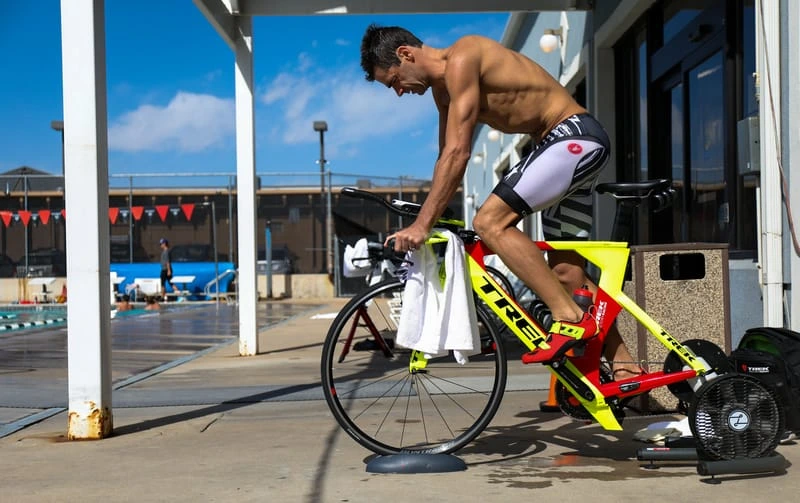
Do you have any advice for triathletes who want to pursue a professional career?
Patience is key in Triathlon, it is not necessarily a young guys game. It takes time to develop the engine to race long-races, and experience is definitely important. You have to have patience and understand it can take some time. But in my opinion, it's worth the effort.
What do you think about social media? How did it affect the popularity of Triathlon?
For me, here's a little bit of a love/hate relationship with social media. It's great that you get to interact with your audience. However, there's also a lot of pressure to drive content when you just want to focus on winning races; they don't always work together. It takes time and energy, and there is an added stress that goes with managing social media. But at the end of the day it's expanding our audience and expanding our value to our partners and this essential to what we do.
In terms of driving popularity, I think we're going to see with Ironman's Facebook watch initiative. It is hopefully reaching a broader audience, and time will tell the impact it will have on the sport.

How can our readers follow you?
The best ways would be on Instagram: @tointri and by subscribing to our YouTube channel: The Tim and Rinny Show. It's a really fun way to get to know Triathlon and us.
What is next for you?
I've had a really rocky start to the year. I had a bad bike crash in March, broke some ribs and have had to battle with sickness, all of which has kept me from the start line. I missed three races but did successfully qualify for the Ironman World Championships with a 3rd place finish at Ironman Boulder in June. I'm just coming into form and took 2nd at Ironman 70.3 Santa Rosa. I'll race Ironman 70.3 Santa Cruz in September and then off course the Ironman World Championships in Kona, Hawaii in October.
Thank you Timothy for your time.
For more information, please click here to visit the website of Timothy O'Donnell
This interview was conducted in a Question-and-Answer format. The answers were checked for grammar and punctuation and published without any additional editing. Thursday, August 1, 2019. All photos are the property of their respective owners.